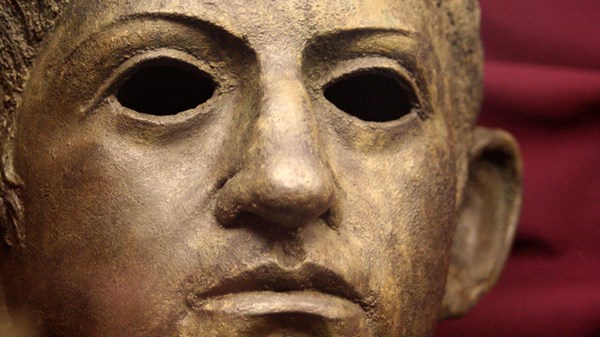1. Nero (37-68)
Nero comes up on top simply because he was able to continue the atrocities of those he followed and improve upon them. He began a persecution of Christians that is legendary and, although he was a builder, he found time off to murder Christians in inventive and gruesome ways.
2. Vespasian (69-79)
This was the emperor who not only continued killing Christians and persecuting the faith but also managed to demolish the Temple of Jerusalem in 70 AD. Perhaps we might forgive him a bit since he managed to put soldiers in both Bavaria and Britain -- foreshadowing their future conversion. He was a grand manipulator who worked to build a dynasty of carnage, including Domitian.
3. Domitian (81-96).
This tyrant managed to rule longer than most but he was without conscience. St. John, Apostle and Evangelist, would testify to this -- having been immersed by Domitian's order into a tub of boiling oil (95 AD) that did not manage to kill him and might have helped him. So he ordered the St. John the Beloved to the isle of Patmos, where, by the way, he
wrote the Book of Revelation under the inspiration of the Spirit.
4. Trajan (98-117)
Though some call him one of the "Good Caesars", he was hardly better than his predecessors and continued persecuting Christians. On the upside, he managed to expand the Roman Empire more than any other ruler since Caesar Augustus and this military conquest ended up helping in the spread of the Gospel (without his knowledge). He was a big fan of the gladiator games and the atrocities of the arena.
5. Hadrian (117-138)
Like Trajan, he was a Spaniard, and kept up the pressure on Christians. He did not hunt them down and drag them out of their homes but he did not give them any breaks either. In the end, Britain's wall, Africa, and the eradication of Palestinian Jews was enough to keep him busy.
6. Marcus Aurelius (161-180)
We remember him more for the mythology of the silver screen than anything else. Gladiator was the movie title. Persecutions were his bane. His time saw a less organized and more local persecution of Christians though he did not seem to be interested in stopping what happened outside of Rome.
7. Maximinus the Thracian (235-238)
With Maximinus Thrace, the killing of Christians did become more organized and throughout the Roman Empire, including Rome. We get this from Eusebius who wrote in his privotal history of the early Church that in 235 Maximinus sent Sts. Hippolytus and Pope St. Pontian into exile. Perhaps without this they might not have been reconciled and died together on the Isle of Sardinia.
8. Decius (249-251)
Like his similarly named successor, Decius put choked the life from Christian believers. In 250 AD, he ruled that all Christians had to pay homage to the Roman gods or be killed. He was true to his word and this was known as “The Decian Persecution.” He killed Pope St. Fabian and then prohibited Christian worship anywhere in the empire. Happily to Christians, he died before this edict lasted even a year!
9. Valerian (253-260)
Valerian upped the game and persecution went out of control. He continued killing Christians, including such famous figures and saints as Lawrence the Deacon, Denis of Paris, Cyprian and Pope Sixtus II. You might think he would be distracted by his continued war with Persia but it did not go so well and he died in their captivity -- one more sign the great Roman Empire might not have a long future
10. Diocletian (284-305)
Diocletian proved to be even worse than Decius and took Rome's angst upon Christians, bringing about the “Great Persecution” which ramped up the killing machine against Christians throughout the Roman Empire. Maybe he saw the writing on the wall because he actually ended up retiring (instead of dying) but the damage was done and Christians bore the brunt of it.
11. Constantius and Galerius (early 4th century)
Though they are two, they ruled in different part of the empire and they both continued the reign of terror upon Christians, destroying church buildings newly built. Christian history remembers Constantius because he was married to St. Helena, who found the True Cross in the Holy Land, and he fathered the first Christian emperor, Constantine the Great (272-337), whose Edict of Milan in 313 made Christianity legal. According to reports, Constantine was baptized by St. Eusebius of Nicomedia. Constantius, his father, however, left no evidence of faith or all that much sympathy with Christians and Galerius made up for Constantius’ with his own all out persecutions of the faith and faithful.
My point being, better men than our current detractors have tried to kill Christianity and threaten Christians but the faith not only survived -- it flourished! Perhaps we need the persecutors to come out of the closet of the appearance of decency in order to revitalize Christianity again. But be careful what you pray for!!!

Pastor Peters wrote: "My point being, better men than our current detractors have tried to kill Christianity and threaten Christians but the faith not only survived -- it flourished!"
ReplyDeleteExcellent, uplifting words for us today, being pounded as "non-essential" and on the wrong side of history because we always ask "Did God really say?" when asked about such simple questions as "is gender binary or some sort of spectrum?" or "is that a child in the womb or just a choice?". Confessional Lutherans always look to "Did God really say?" of Scripture for the answer.
This past Sunday we sang "THE CHURCH SHALL NEVER PERSHISH" and that is true. Your history lesson on persecutions of the church was interesting and timely, and comforting...but good Confessional writing always is comforting.
Timothy Carter, simple country Deacon. Kingsport, TN